Tony Levin: The Groove Abides
Tony Levin needs no introduction. Most likely, you have heard Tony playing bass; you just didn't know it. I first met...
Continue Reading Take Me to More News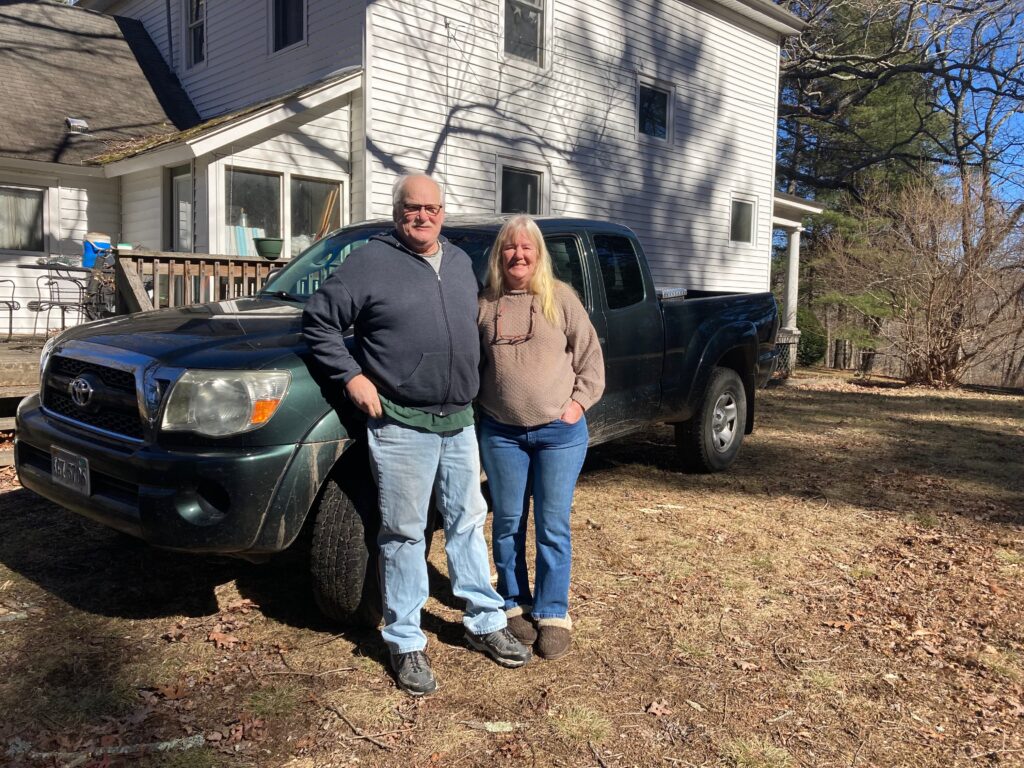
This story originally aired in the March 24, 2024 episode of Inside Appalachia.
Coles and Theresa “Red” Terry have been fighting over the Mountain Valley Pipeline nearly since it was first proposed in 2014.
The project connects natural gas terminals in Virginia and West Virginia with a 303-mile pipeline that stretches across some of Appalachia’s most rugged terrain. Almost immediately after construction began, protesters tried to block it by setting up and living in platforms in trees along the route.
Theresa Terry, better known as “Red,” was one of those tree sitters, and she stood out. She was in her 60s — and she wasn’t just an activist. She was tree-sitting on her own land. Back in 2018, Inside Appalachia Host Mason Adams interviewed her from on the ground, outside a police barrier that had been set up to prevent her from receiving supplies from her supporters.
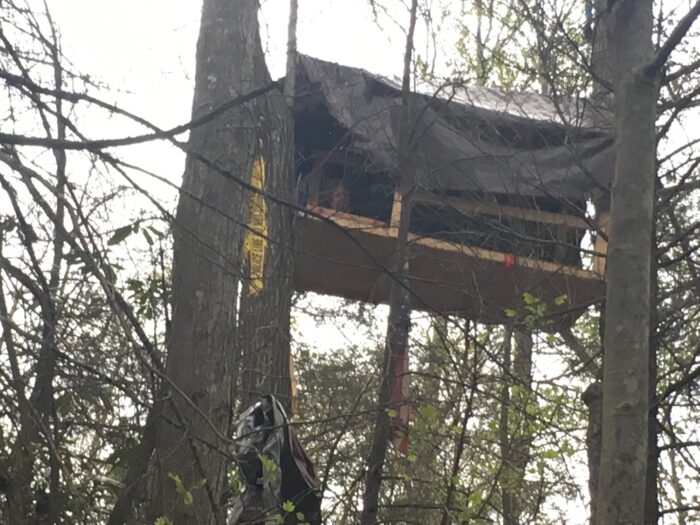
Not long after the interview, Red was forced out of the trees by a judge who threatened her with a $1,000 per day fine. But Red and her husband Coles have continued to fight the pipeline in court.
Since Congress approved a law that included a provision to force completion of the Mountain Valley Pipeline, they’ve been seeing construction crews again. Adams wanted to learn more about what’s happened in the six years since Red came down from her tree sit. So he ventured out to Bent Mountain, Virginia, to talk to Red and Coles on their family land.
This interview has been lightly edited for clarity and length.
Adams: How long have y’all lived on this land here in Roanoke County? Did you grow up here?
Coles: I didn’t grow up up here. I grew up in town. My dad, he was an insurance agent. He had his own business. I grew up in Roanoke, but this property’s been in my family for, you know, several generations. We’ve lived up here since we got married. We were married in the front yard, and pretty much came back from our honeymoon into this house.
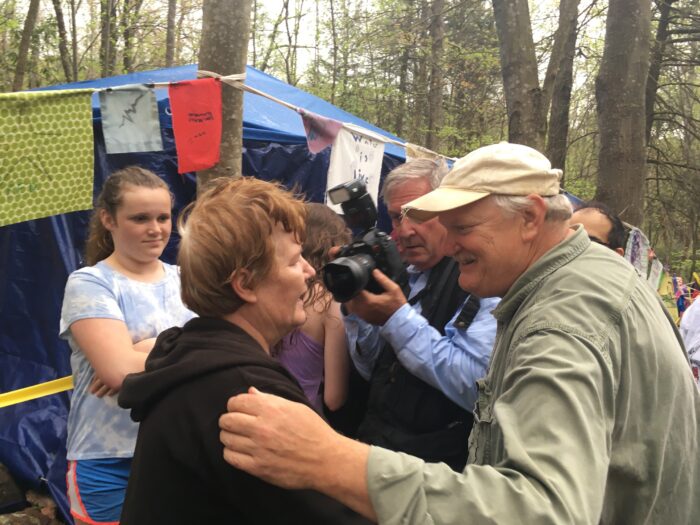
Adams: So I remember the kind of pipeline being announced. When did y’all learn that the Mountain Valley Pipeline was supposed to come through this property?
Coles: March 28, 2015. We got a letter from the county telling us that our property was one of their proposed routes. Two-hundred and two landowners were served at one time, because it was just quicker and easier to take us all to court. I think we got one offer from them. It was a ridiculously low offer. [We] just said no, and the next thing I know, I’m being sued for eminent domain. There was no negotiating, there was no coming by and talking, “Hey, this is what we can do,” sitting down and talking to you about anything. It’s just, “Hey, no, we’re taking it. This National Gas Act allows us to do that. It put it in the national interest.” Unfortunately, the national interest doesn’t include also protecting people’s personal property, the water or people’s well-beings. It’s just, “It’s in the natural interest to get this pipeline in the ground and pumping gas.
Adams: That was 2018. Here we are now in 2024. I drove in and there are still visible pipeline crews.
Coles: Oh yeah. Everywhere.
Adams: What’s it like to live next to that for six years? How do you come to terms with that?
Coles: For a while, you still had the hopes that, because they were still working on getting all their permits and we were still commenting, and we were still meeting with people in these organizations who were supposedly there to prevent anything going wrong, [they’d] step up and say, “Hey!” But they just kept getting, “Well, this, this looks good to us. This looks fine. There’s nothing to see here. Go ahead. You can do what you need to do.” It just gets more and more disheartening every day. We’re still fighting. They’re still ongoing. We’re taking pictures. We’re trying to show where the sediment’s coming in, and, they’re basically not even getting a slap on the wrist anymore.
I don’t even want to be outside. I don’t want to hear them. Just the fact that I know they’re there is hard enough on me. It’s tough sometimes. Right now, I can hear them when I go outside. I can’t see them because they have finished burying the pipe behind my house for the most part. They still have to test it and then restore it and everything. But that could still take years.
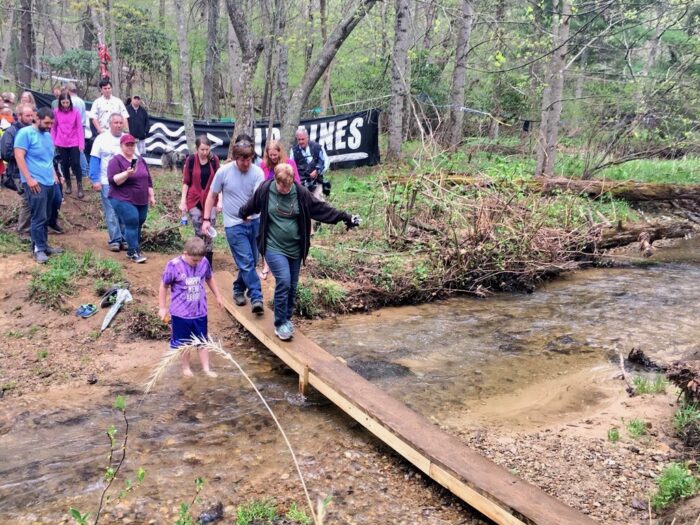
Adams: Red, you showed me your photo roll, and a lot of photos with the sedimentation and the slime. I remember you scrolled down a good way, and I was overwhelmed in a way, because you had other photos of family and things like that. But so much of your photo roll was just documenting this damage. Like every day when you drive out, you’re just surrounded by it. And you’re dealing with a bureaucracy that seems unresponsive. So I’m wondering, what keeps you going? What gives you hope? What helps you get up and keep fighting this battle day after day, after day?
Coles: For me? I guess it’s the hope that maybe somebody somewhere will will say, “Yeah, we need to stop this or slow this down.” A lot of it, too, is tried to stop it from happening to somebody else. They’re now proposing another pipeline that’s going to be just as big as this one and just as bad as this one. I admire President Biden for halting any new LNG [liquefied natural gas] buildout. We’re already one of the biggest exporters of LNG in the world. The UK and European nations are trying to get away from LNG, and so the market for that is going to collapse. But we’re going to force the country to build more infrastructure to support it. We don’t know where it’s even gonna go.
Red: From day one, it has been nothing but lies. When your daughter — who is just as mean and ornery and, in my eyes, perfect — looks at you and says, “I won’t be alive in two years,” because this bomb’s gonna go off. And we are in the blast zone. I’m 600 yards from that bomb. Everybody up here on this mountain right now, including myself, have pipes floating in water. That one out there floated in over four feet of water for a month. They came in and took two pumps to pump it dry, heat it up, welded it, threw it in there and covered it with mud. You’re not supposed to cover it with mud. But hey, okay, they’re in a hurry. They don’t have to really do anything that they’re supposed to do.
What gets me up in the morning? I don’t want to get up in the morning. I don’t want to do anything. I have so much **** to do, and I’m paralyzed.
Adams: So now MVP is telling investors and the press that they expect to be completed this spring. What do you all foresee in the future? What do you expect will happen?
Coles: Do I think they’ll be done by the end of March? I see pictures of pipe still above ground. I don’t know how long it’s going to take them to bore under [Interstate] 81. I know there’s some really hard rock there. I know that they might have finished one of the bores at my sister’s, but it took them a lot longer than they thought it was going to. They’re still blasting over there.
So, either they’ve given up boring or they’re just digging through, I’m not sure. I find it hard to believe this pipeline will be in service by the end of the first quarter of this year. “In-service” means a lot of different things to me. Even if the whole pipe’s in the ground, it still has to be tested. The right-of-way has to be restored. FERC [Federal Energy Regulatory Commission] still has to approve it. I was told that it could take ‘til 2026 or 2027 to get everything restored.
Adams: That thing you said about Minor [their daughter] saying she doesn’t expect to be alive in three years?
Coles: Yes. Because she thinks once they start putting gas in this thing, it’s going to rupture and explode.
Red: This is one of the steepest, unbelievable, someone sitting in an office drawing a line. And I understand what they did because they have tried to go to the largest landowners so that they don’t have that many fights, so they don’t have that much opposition.
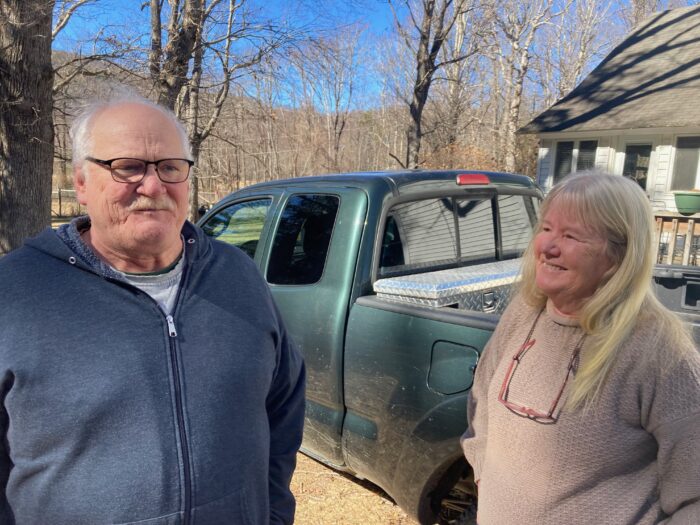
Adams: When I was a cub reporter at the Roanoke Times and somebody gets shot and killed, you’d have to go to talk to their family — like that level of grief. That’s what this feels like.
Red: When Coles and I got married, and when we moved up here, this wall was falling in. This was screens that had been ripped and torn. These boards under here were this wide and they were spaced to have plenty of room between them. And my dearest husband hooked a come-along to a tree out here and pulled the house back out, put in the drop ceiling, put in the staircase here, put in the windows. We laid some floor, put some carpet down, opened the door. And every morning, every ******* morning. I would get up — my kids got me blinds to close for the MVP, I’ve never had blinds up — but every morning I would go out here and look, and just stand there and look, and think to myself, “I must be the luckiest person alive to have this view.”
Now, every time I look, I see the flags. I see the damage. I see the destruction. And I mean, my view, my hike through there, my apple orchard on the top where I went mushroom hunting, and all the critters in the world up here went up to that top orchard. Because the trees were so big. I had one up there that just produced so much. And all of that is now part of their LOD. And it just … it’s heartbreaking. It’s heartbreaking what they’ve done. I mean, I still love this mountain, but it’s heartbreaking what they’ve done to so many parts that were so beautiful. And then the other day, when my son was here, and I stopped at the mailboxes, and I parked on our road, our driveway, and I walked over to the mailboxes and all the MVP guys were leaving. So I “waved” to ‘em. And one guy went by me in a big blue truck, and he slammed on his brakes.
Now, you got a whole crew leaving, and he slammed on his brakes, and I’m standing at my mailbox waiting on them to pass. And he comes over and goes, “You don’t know me. You don’t know me. Don’t be shooting the finger at me.” And I looked at him. I said, “Are you a pipeliner?” He said, “Yes, I am.” I said, “Well, I don’t have to know you to know what you’re doing to my land, and yeah, I’d like you to go the **** home.” And he said, “I’m not going anywhere,” and he gets … he’s a little taller than I am. And he’s like, “If you don’t like it, why don’t you move?” And I’m like, “My husband’s family has been here for seven generations.” He goes, “I’ve been a pipeliner. We’ve got pipeliners for six generations.” But he gets up over me.
I said, “Bring in on, ***********. You don’t have anything that scares me. I’m old. I’m tired. And I used to be a redhead before you ************* showed up. So do your worst. I’m not afraid.” And the guy about 10 trucks back jumped out and came up and grabbed him. “Get in your truck and leave.” He goes, “I’m not finished.” He says, “Yes you are. Get in your truck and leave.” And I’ve never had such evil thoughts in my life. I have never wanted to hurt anyone. And things are changing. Things are changing. I would like to hurt somebody really bad.
——
After this interview, Inside Appalachia reached out to pipeline officials about the Terrys’ claims.
Pipeline spokeswoman Natalie Cox sent a statement:
“MVP project opponents continue to promote factual inaccuracies in support of their agenda, which includes a primary objective to stop MVP and other linear infrastructure. The MVP project has been subject to an unprecedented level of scrutiny, and the fact is the VADEQ, WVDEP, and other agencies continue to conduct daily project inspections, and the inspection process is working as designed. If and when any compliance issues are identified, Mountain Valley takes immediate responsibility to remediate the identified issue or concern. As has always been the case, completing construction and fully restoring the project’s right-of-way remains the best method of permanent environmental protection.
“Mountain Valley will continue to coordinate with all appropriate state and federal agencies, including FERC, USACE, VADEQ, VDCR, and WVDEP, to ensure the safe, responsible completion of the project, which includes building and operating the project in accordance with all applicable regulations, incorporating best management practices, and meeting or exceeding applicable industry standards for linear infrastructure.”
Construction continues on the Mountain Valley Pipeline. Company officials project it will be completed by June 2024.